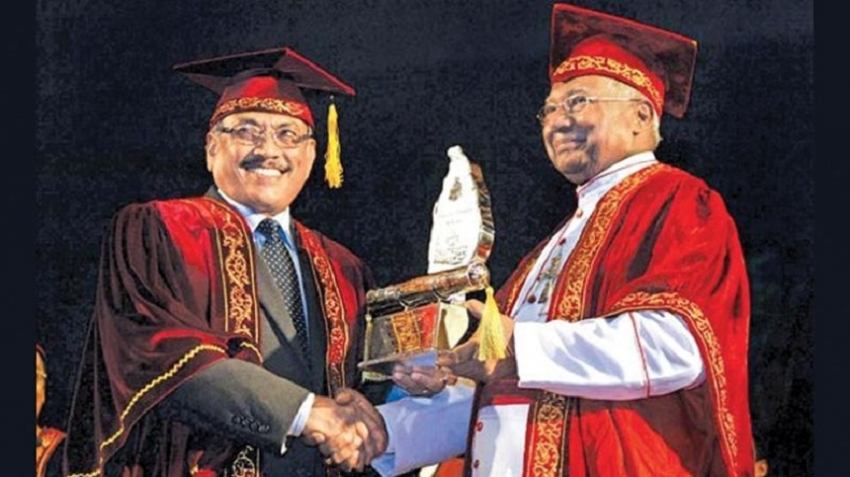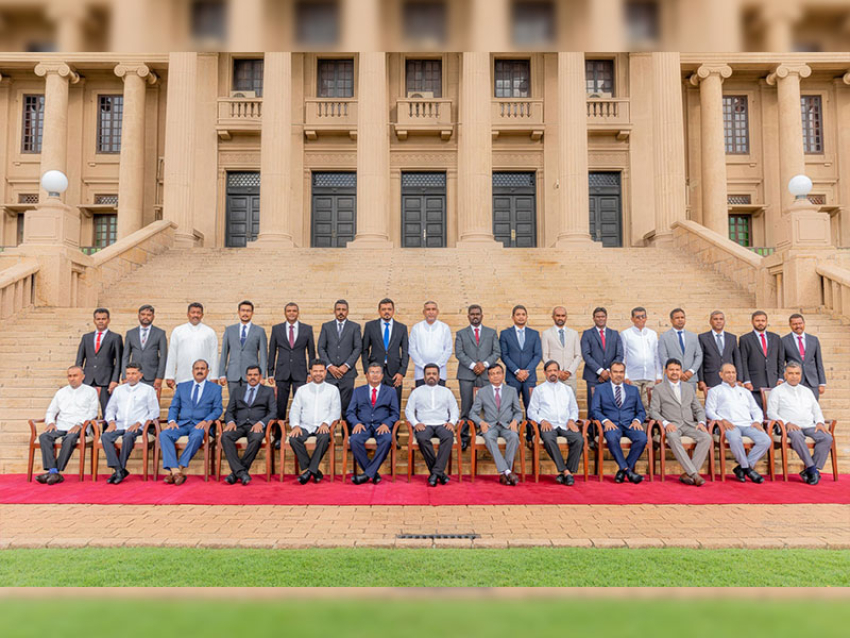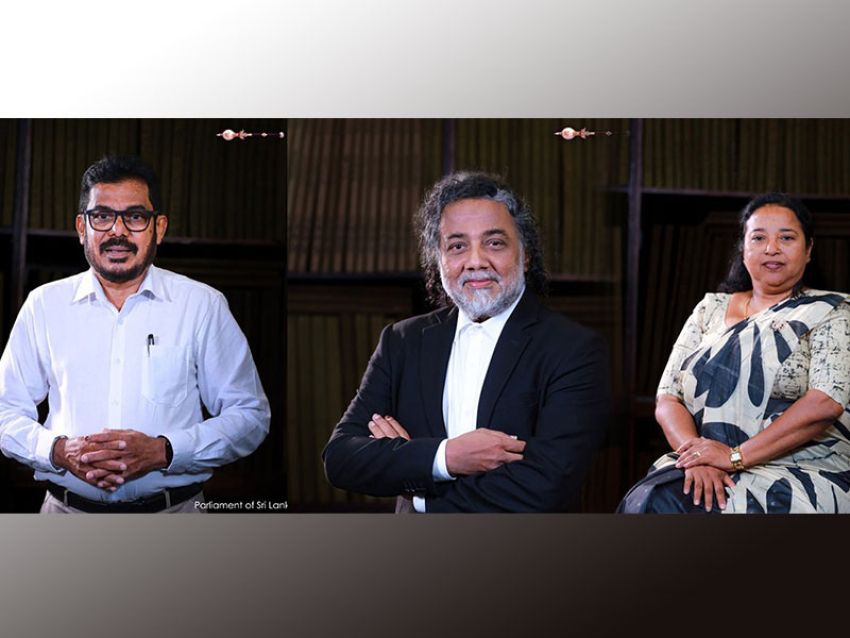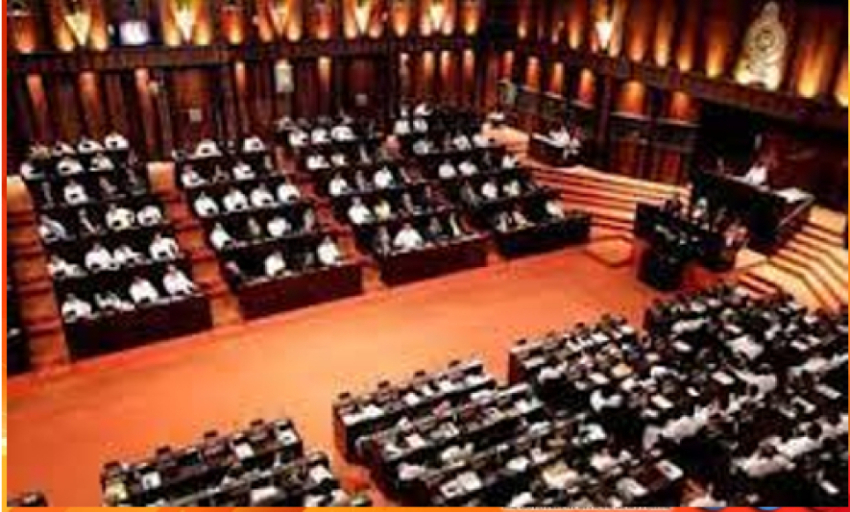BY REAR ADMIRAL DR. SHEMAL FERNANDO PHD
As the minutes ticked away and hours went by, it was becoming blatantly clear, as night follows day that the military officer turned professional turned public servant, Gotabaya Rajapaksa was romping home as victor at the Presidential Election held on November 16, 2019. With His Excellency Gotabaya Rajapaksa now as the Executive President of Sri Lanka and Commander-in-Chief of the Armed Forces of Sri Lanka, a month into his administration is already steering his ship steadily from the helm to the admiration of all citizens of the country. As a country, Sri Lanka has started experiencing the much dreamed political transformation, bold leadership and discipline in governance, yearned for years.
This article attempts to share His Excellency Gotabaya Rajapaksa’s journey as a professional soldier to reach the helm of the country as the Executive President through a military career in the Sri Lanka Army, 1971 through 1992, a professional and academic stint that enhanced his professionalism, 1993 through 2004, and a stint as the Defence Secretary of Sri Lanka, 2005 through 2014 which surely etched his name in the annals of the Sri Lankan history. Surely, he has touched many hearts and minds all along and earned a lasting niche to be recognized as a patriot, an officer and a gentleman, a proven leader and a thorough professional.
It is the ardent desire of all citizens of the country that President Gotabaya Rajapakse will unite the country under one National Flag as he expressed in his inaugural speech taking oaths as the President that he is the President of all citizens by making the transition to a new era with positive changes in a coordinated approach. It is expected that he will strive to advance the Sustainable Development Goals (SDGs) and climate action, ensuring national reconciliation, which is perhaps the most urgent need of the hour.
Early life
Nandasena Gotabaya Rajapaksa was born in Palatuwa in the Matara District on June 20, 1949 and brought up in Weeraketiya in the southern rural Hambantota District. The name Gotabaya means, “Abhaya, the Giant” and all Sri Lankans expect him to deliver befittingly. He hails from a well-known political family in Sri Lanka and his father, D. A. Rajapaksa, was a prominent politician, independence agitator, Member of Parliament, Deputy Speaker and a Cabinet Minister. He obtained his primary and secondary education at Ananda College, Colombo.
Military career
He joined the Sri Lanka Army as a Cadet Officer on April 26, 1971, when Sri Lanka was still a dominion of the British Commonwealth. He was commissioned as a Second Lieutenant on May 25, 1972 and earned his first command as an officer in the Ceylon Signals Corps. Thereafter, he served in the Sri Lanka Sinha Regiment and the Rajarata Rifles before being transferred to the Gajaba Regiment upon its formation in 1983.
He rose to the rank of Lieutenant Colonel and was bestowed with the Rana Wickrama Padakkama and the Rana Sura Padakkama for his invaluable contributions during the battles, “Operation Liberation”, “Operation Strike Hard” and “Operation Thrivida Balaya”. He attended Signal Young Officers Course and Infantry Company Commanders Course in Pakistan, Jungle Warfare and Counter Insurgency Course and the Command and Staff Course in India and the Advanced Infantry Officers Course in the USA. His commands included the 1st Gajaba Regiment and the General Sir John Kotelawela Defence University.
Doctor of letters
The University of Colombo, conferred the honorary degree of Doctor of Letters to him on September 6, 2009 at the Postgraduate Convocation Ceremony in recognition of his services to the country in safeguarding its territorial integrity and sovereignty by defeating the LTTE and restoring peace and harmony among all Sri Lanka communities and uplifting the image of Sri Lanka within the international community.
Defence Secretary
On April 6, 2004, Hon. Mahinda Rajapaksa was sworn in as the Prime Minister of Sri Lanka and his sibling, Gotabaya Rajapakse was recognized with the appointment as the Military Advisor to the Prime Minister. Then, on November 19, 2005, His Excellency Mahinda Rajapakse was voted to the chair of the Executive President and as the Commander-in-Chief, he relied on Gotabaya Rajapaksa for the all-important position of the Defence Secretary in a country that was devastated by a protracted civil war that erupted in the year 1983.
Origin and evolution
The origins of the Sri Lankan Civil War lie in the continuous political rancor between the majority Sinhalese and the minority Tamils. The roots of the modern conflict lie in the British colonial rule. The LTTE’s modus operandi of the early war was based on assassinations. In July 1983, the LTTE launched a deadly ambush on Sri Lanka Army patrol in Thirunelveli, killing an officer and 12 soldiers. It is considered the beginning of the civil war. Apart from the LTTE, initially there was a plethora of militant groups. The LTTE carried out over 378 suicide attacks, one of the largest suicide campaigns in the world. A crisis leading to the first large scale fighting occurred when the LTTE closed the sluice gates of the Mavil Aru reservoir on July 21, 2006.
Suicide attempt
It’s still fresh in our memories how the LTTE, the world’s most ruthless terrorist outfit inflicted nothing but misery when they unleashed terrorism in the guise of liberation. On December 1, 2006, Gotabaya Rajapaksa as the Defence Secretary was targeted and narrowly escaped an LTTE suicide attempt when the terrorists activated a powerful bomb targeting his car at Dharmapala Mawatha, Colombo 7. The suicide bomber rammed his three-wheeler into the convoy of the Defence Secretary who was en-route to the Presidential Secretariat for an official meeting.
The suicidal bomb explosions by the LTTE targeting VVIPs, killed personalities such as the Deputy Defence Minister, Ranjan Wijeratne (March 2, 1991), Indian Prime Minister, Rajiv Gandhi (May 21, 1991), Commander of the Navy, Admiral Clancy Fernando (November 16, 1992), President of Sri Lanka, R. Premadasa (May 1, 1993), Leader of the Opposition, Gamini Dissanayake (October 24, 1994), moderate Tamil politician, Dr. Neelan Thiruchelvam (July 29, 1999), Minister, C. V. Gooneratne (June 7, 2000), Foreign Minister, Lakshman Kadirgamar (August 12, 2005), Deputy Chief of Staff of the Army, Major General Parami Kulathunga (June 26, 2006), the Chief Government Whip, Jeyaraj Fernandopulle (April 6, 2008) and Major General Janaka Perera (October 6, 2008).
The courage and bravery of Gotabaya Rajapakse to concentrate on his vision to wipe out terrorism even after an attempt on his life and knowing very well the threat from the world’s deadliest terrorist organization needs special emphasis. Besides, his sterling quality of inspiring and leading from the front was a tremendous boost to the military hierarchy. The foregoing paragraphs will deal with the unprecedented victories achieved by the country in the civil war under his leadership as the Defence Secretary in a nutshell.
Road to peace
The Defence Secretary shared, “A total defeat of the LTTE is necessary before a political solution to the ethnic crisis can be implemented”. “Terrorism had to be crushed for the democratic process to be effective and one should not mistake the defeat of the LTTE for that of a particular ethnic community.
All members of the armed forces are making tremendous sacrifices but their efforts will be in vain unless there was a practical and pragmatic defence policy to defeat terrorism”. It was reported under the heading, “Total destruction of LTTE a must before political solution” in ‘The Island’ of September 18, 2007.
Year 2007
In the defence column of ‘Sitrep’ of Sunday Observer of December 30, 2007, it was reported that the year 2007 as one of great achievements against terrorism. The victories in tireless efforts in eliminating terrorism from our land kept the armed forces, the Police supported by the Civil Defence Force on higher pedestal than ever before. The Army captured Vakarai on January 9, the Navy destroyed the first LTTE arms ship off Dondra Head on February 28 and followed up with destruction of another two LTTE arms ships in the seas off Arugam Bay on March 18, Army’s Commando troops captured Thoppigala on July 10, the security forces captured Silavaturai on September 3, the Navy destroyed three more LTTE arms ships on September 24 and 25. The Navy was able to completely destroy the entire fleet of the LTTE arms ships with destruction of MV Mitshuma in the seas off Dondra Head on October 7, the Air Force killed LTTE political wing leader S. P. Thamilselvan on November 2 and in aerial bombardments in the vicinity of Jeyanthy Nagar in Kilinochchi, the LTTE leader Velupillai Prabhakaran sustained injuries on November 26.
Military success
In an exclusive interview with the Sunday Observer of December 30, 2007 in the column ‘Sunday Meeting’, Gotabaya Rajapaksa shared his firsthand experience in the battlefront that enabled him to be a tower of strength behind the military success in his first two years as Defence Secretary. In that interview titled under ‘Outlaw LTTE: Let’s go for fresh start’, he shared about his military career, “After school, I joined the Army and I was a much disciplined Army Officer. In my career, I had taken part in major operations. When you are a professional and when you are in the military you do not think about politics. I worked very closely with Minister Ranjan Wijeratne and he praised me on many occasions”.
Year 2008
The Defence Secretary Gotabaya Rajapaksa repeatedly urged the government to abandon the Ceasefire Agreement and on January 2, 2008, the Sri Lanka government responded positively.
The Army captured Adampan on May 9, Mannar on June 30, Vidattaltivu on July 16, and Iluppaikkadavai on July 20. The government military gained Vellankulam on August 2, Mallavi on September 2, the Tiger stronghold of Pooneryn on November 15 and Mankulam on November 17 to end the year as one of the most successful in the battle front.
Year 2009
The year dawned with the Sri Lanka Army troops capturing Paranthan on January 1, Kilinochchi on Jan 2, and the entire Jaffna Peninsula by January 14; captured Mullaitivu on January 25 and the last Sea Tiger base in Chalai on February 5. The Battle of Aanandapuram, which was described as the ‘defiant moment’ of the three decades of war was fought on April 5. By April 25, the area under the LTTE was reduced to 10 square km. On May 16, Sri Lankan troops broke through LTTE defences and captured the last section of coastline held by the Tamil Tiger rebels.
Liberation of the country
On May 16, 2007, addressing the G 11 Summit in Jordan, President Mahinda Rajapakse stated that in an unprecedented humanitarian operation finally the government defeated the LTTE militarily. On May 18, 2009, Colombo declared the end of the 26-year civil war. On May 19, President Mahinda Rajapaksa delivered a Victory Address to the Parliament and declared that Sri Lanka is liberated from terrorism. It was the beginning of a new era of peace, national reconciliation and development.
Gota’s war
The masterpiece by C. A. Chandraprema titled, “Gota’s War” launched on May 14, 2012 describes the story of the entire war between the government of Sri Lanka and the LTTE in the context of the wider political conflict which began in 1956 and how the world’s deadliest terrorist organization was completely annihilated by President Mahinda Rajapaksa’s government and the pivotal role played by the soldier turned IT professional turned public servant Gotabaya Rajapaksa as the Defence Secretary.
New vistas
As the Defence Secretary, Gotabaya Rajapaksa tremendously inspired the entire armed forces of the country, the Police and the Civil Defence Force. The awareness programme ‘Api Wenuwen Api’ brought desired results with hundreds who left after serving 12 years as well as deserters coming back to strengthern the war effort. Establishment of the Defence Service School, a national school for the children of military and police personnel was a long felt need ad eased the burden on the military parents. ntroducing the world’s first scintillating military reality TV talent show, ‘Ranaviru Real Star’, afforded opportunities to the War Heroes to display their non-military prowess and aesthetic talents, provided entertainment to the battle tired military personnel and the winners presented with luxury houses.
The Defence Services Games lifted the sportsmen and sportsmen of the armed forces to the international arena and in return they brought honour and glory winning elite medals for the country. The medals won at Para Olympic Games by the wounded War Heroes is truly a success story. The introduction of the ‘Day Scholar’ facility at the General Sir John Kotelawela Defence University opened the doors for thousands of children to dream of basic degrees in a disciplined environment.
The strengthening of hospital facilities and healing homes for War Heroes such as ‘Mihindu Seth Medura’ benefitted the wounded in battle. The New Houses with modern facilities for War Heroes such as ‘Ranajayapura’, land and educational scholarships for children, innovation in every sphere of the military and enormous infrastructure development across the country was very much visible and uplifted the living and professional standards of the men and women in uniform. Besides, his contributions as the Secretary of Urban Development is too numerous to record and the entire country got a facelift and he won the admiration of all Sri Lankans.
National interest
On June 13, 2013, Gotabaya Rajapaksa as the Defence Secretary addressed the First PhD Programme at the General Sir John Kotelawela Defence University on the topic, “Sri Lanka’s National Security Concerns” launching the National Interest Module – another first in academic sphere. He shared, “guarding against various threats and ensuring the safety of the nation is the first duty of the government, because National Security is the foundation of our freedom and our prosperity. As such, the government needs to be fully aware of all the issues that impact the country in areas such as Defence, Foreign Policy, Economic Affairs and internal Law and Order. It must formulate a comprehensive National Security strategy to deal with them”.
He further said, “Ideally, if comprehensive security is to be ensured, it requires the achievement of national cohesion, political and economic stability, the elimination of terrorism, the countering of extremism, and the formulation of effective responses to external challenges”. He concluded, “The government must make every effort to keep aware of a continually changing situation and take appropriate action in response to new developments and challenges. It is only then that the safety of the nation can be assured”. He concluded, “Ultimately, the best way to ensure that Sri Lanka remains safe and strong in the future is for all of us to put aside the differences of the past; unite as Sri Lankans, and work towards a better future for ourselves and for each other”.
On a personal note, I salute His Excellency the President for the bold step he took in 2012 as the Defence Secretary to afford the opportunity to the senior military officers to reach the highest academic qualification by introducing the First Programme of MPhil/PhD at the General Sir John Kotelawela Defence University and for the life changing lecture delivered on 13/06/13 which motivated me to take up the challenge to pursue on a topic under ‘National Interest’ and achieve PhD in Strategic Management introducing a National Policy for the wellbeing of the future generations.
Forward march
And as the new President sails past one month in office, we could do no better than believe in the concluding words of the inaugural address by the President of America, the late John F. Kennedy, when he pledged thus, “with a good conscience our only sure reward, with history the final Judge of our deeds, let us go forth to lead the land we love, asking for His blessing and His help, but knowing fully well that God’s work here on earth must surely be ours”.
As Sri Lankans we should hold on to Rudyard Kipling’s ‘IF’ and strive to ensure that Rev. W. S. Seniors’ dream for us as Sri Lankans in his ‘Call of Lanka’ is realized under the new President.
“I climbed o’er the crags of Lanka
And gazed on her golden sea,
And out from her ancient places
Her soul came forth to me”.
“But most shall he sings of Lanka
In the brave new days that come,
When the races all are blended
And the voice of strife is dumb”.
“Rise Child of Lanka and answer!
Thy mother hath called to Thee”.
(The writer served the Sri Lanka Navy, 1979 through 2014, retiring as the Director General Administration and the Civil Defence Force, 2015 through 2018, as the Additional Director General.A graduate of the US Naval War College, he earned a PhD, MPhil and double MSc. A humanist, enthralled in serving the War Heroes at Sri Lanka Ex-Servicemen’s Association and Sri Lanka Naval Association).
-




















